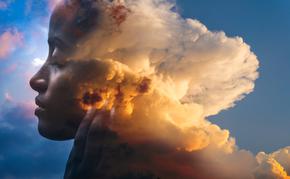The views expressed in our content reflect individual perspectives and do not represent the authoritative views of the Baha'i Faith.
Pearly gates, grand harps, and a kingdom floating in the sky — thanks to Old Master paintings and Hollywood films, those things symbolize heaven for most people. But heaven isn’t just a fictional place in art and movies — a majority of Americans believe it exists.
A 2021 Pew Research Center survey found that 73% of Americans believe in heaven. In 2014, Pew defined heaven as a place “where people who have led good lives are eternally rewarded.” That’s a common enough understanding of heaven, and it’s what most people are taught throughout their religious or spiritual experience. But is that what heaven actually is, and if so, how do we get there?
What Is Heaven?
Often heaven is thought of as this majestic physical and stationary place where all the people who led “good” lives can leisurely relax and enjoy. But Baha’is believe that the afterlife “is not a material location but is sanctified above time and place.”
Only our physical bodies are confined to small places and time constraints. Our minds and spirits can, as the Baha’i writings say, traverse “all countries and regions and even the limitless expanse of the heavens; it encompasses all existence and makes discoveries in the spheres above and in the infinite reaches of the universe. This is because the spirit has no place: It is a placeless reality, and for the spirit earth and heaven are the same, since it makes discoveries in both.
RELATED: What Is Our Real, Spiritual Reality?
Abdu’l-Baha, the authorized interpreter of the Baha’i writings and the son of Baha’u’llah, the prophet and founder of the Baha’i Faith, spoke and wrote about heaven. He said that the kingdom of God, or heaven, is “a spiritual realm, a divine world, and it is the seat of the sovereignty of the almighty Lord. It is exalted above bodies and all that is corporeal, and it is freed and sanctified from the idle conjectures of men.”
So, the details of the afterlife are beyond anything we can ever conceive of or comprehend. But Baha’is believe that spiritual growth and progress is always possible after we die. Baha’u’llah wrote:
Know thou of a truth that the soul, after its separation from the body, will continue to progress until it attaineth the presence of God, in a state and condition which neither the revolution of ages and centuries, nor the changes and chances of this world, can alter. It will endure as long as the Kingdom of God, His sovereignty, His dominion and power will endure.
How Do We Get to Heaven?
The Baha’i writings say that, compared to eternity, this life we’re experiencing now is like “a shadow that vanisheth swifter than the twinkling of an eye.”
And yet, we tend to spend most of our thoughts, energy, and time focused on our current temporary existence. Taking care of our responsibilities in this life is essential, but how do we also plan for our soul’s eternal journey and ensure we’re building the necessary spiritual habits, goals, and pursuits to help us “get to heaven”?
When asked about “eternal life and entrance into the Kingdom” Abdu’l-Baha replied:
Entrance into the Kingdom is through the love of God, through detachment, through sanctity and holiness, through truthfulness and purity, through steadfastness and faithfulness, and through self-sacrifice.
This love of God helps us be steadfast in adhering to spiritual principles and inspires us to love and serve humanity.
RELATED: Why Do We Have Religion?
Baha’is believe that life’s purpose is to acquire virtues — spiritual qualities and behaviors — and in the Baha’i Faith:
Truthfulness is the foundation of all human virtues.
The Baha’i writings also say:
Without truthfulness progress and success, in all the worlds of God, are impossible for any soul. When this holy attribute is established in man, all the divine qualities will also be acquired.
It is this daily, persistent effort to be an honest person and live an honest life that enables us to practice other virtues — kindness, justice, detachment, and faithfulness, for example — that we need in the next world.
The Baha’i writings also emphasize devoting our lives to engaging in service to humanity. As we strive to contribute to and transform society, we can also endeavor to transform our inner life and character.
For the past 3,000 years, the Ten Commandments have been a spiritual backbone of society — a guide to living our lives and developing virtues. Following these spiritual principles still puts us on the path to being better prepared for life after death. Indeed, the Baha’i Faith affirms the Ten Commandments while also expanding their scope, and clarifying their meanings.
But Shoghi Effendi, the Guardian of the Baha’i Faith, also wrote that the tools that we need for our spiritual growth are a “rectitude of conduct, an abiding sense of undeviating justice,” freedom from the “cancerous growth of racial prejudice,” and “a chaste, pure, and holy life.”
We might be tempted to think that if we simply avoid behaviors such as infidelity or stealing, then we are going to heaven. But we might not consider that devoting our lives to eliminating racial prejudice in our personal life, as well as from our family, workplace, and community, helps us develop the spiritual qualities and virtues needed in the afterlife.
As Baha’u’llah wrote:
Blessed is the soul which, at the hour of its separation from the body, is sanctified from the vain imaginings of the peoples of the world. Such a soul liveth and moveth in accordance with the Will of its Creator, and entereth the all-highest Paradise.
The Maids of Heaven, inmates of the loftiest mansions, will circle around it, and the Prophets of God and His chosen ones will seek its companionship. With them that soul will freely converse, and will recount unto them that which it hath been made to endure in the path of God, the Lord of all worlds.
We can each do our best to make sure that when the angels and prophets that Baha’u’llah wrote about circle around us and ask what we’ve done at the end of this physical journey, we have worthy stories to tell them.
RELATED: Are Angels and Devils on Our Shoulders?
Of course, there are no guarantees regarding what happens to our soul after we die — there is no magic formula to follow that assures us we’ll “get to heaven.” But Baha’is believe that:
Holy words and pure and goodly deeds ascend unto the heaven of celestial glory.
So, everything that we do here in this world will certainly influence our spiritual state, abilities, and attainments in the next world.

















Comments
Sign in or create an account
Continue with Facebookor